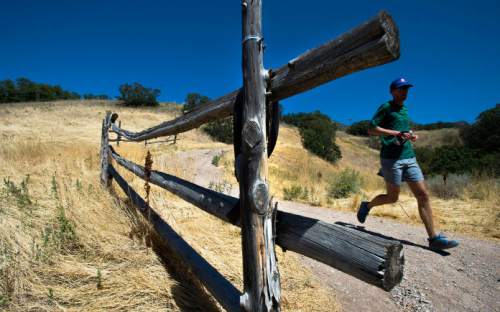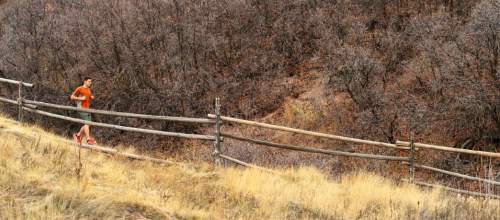This is an archived article that was published on sltrib.com in 2015, and information in the article may be outdated. It is provided only for personal research purposes and may not be reprinted.
Washington • Rep. Rob Bishop unveiled a bill Thursday to overhaul a federal land-buying program in a way that significantly restricts the government's ability to purchase acreage in the West and diverts funds to permitting offshore oil drilling and training energy workers.
Bishop, a Utah Republican who came under fire for holding up a renewal of the Land and Water Conservation Fund (LWCF), said his proposal would steer the program to helping with locally driven projects, boost American jobs and curtail the expansion of public lands.
"If we're going to spend this much money, we can't think small," said Bishop, chairman of the House Natural Resources Committee. "We have to think of something big that's going to help people or we shouldn't be doing it at all."
His legislation, quickly denounced by conservation groups, would revamp the 50-year-old program and authorize it for another seven years, though Democrats and the Obama administration are likely to fight the proposal. Renewal of the program, funded through a portion of oil and gas royalties on public lands, had bipartisan support before Bishop blocked that and allowed it to expire at the end of September.
The fund has helped pay for some 40,000 projects nationwide, totaling $17 billion. Utah projects have received $171 million, including $13 million toward helping complete the Bonneville Shoreline Trail along the Wasatch Front.
Bishop's bill would:
• Require at least 45 percent of the $900 million in annual revenue be earmarked for a state grant program to help pay for local recreation projects.
• Restrict the federal government from using more than 3.5 percent of the money to buy more land, and then it could buy only privately owned acreage inside national parks. Additionally, only 15 percent of the new land bought could be west of the 100th meridian, which runs from North Dakota to Texas.
• Bar any funding from going toward obtaining land through eminent domain.
• Steer 15 percent of the fund to the Payment in Lieu of Taxes program that compensates county governments with large public land swaths.
• Divert 20 percent of the fund to launch new offices to streamline offshore oil and gas permits and starting a new Offshore Energy Technology Hub to boost cooperation with academic institutions and the energy industry. Part of that money would also go to science and engineering-focused grants to train the energy workforce.
Bishop said that the expansion of public lands through the LWCF has negative consequences for local and state governments with the decrease in the tax base and the federal government doesn't need more acreage when it has a $20 billion maintenance backlog on land it already owns.
The bill, he said, "bolsters the successes of the LWCF and addresses the failures and addresses the abuses."
Democrats and conservation groups had been calling on Bishop to allow a straight-up renewal of the program — which enjoys broad bipartisan support — as had been done in the past, a point that Bishop called "stupid" because it doesn't address any shortcomings.
His new legislation brought a swift rebuke.
"Representative Bishop's bill is a deliberate effort by anti-conservation extremists to dismantle a successful and popular bipartisan program and distract Congress from the urgent need to fully fund and permanently reauthorize the Land and Water Conservation Fund in its current form," said Alan Rowsome, senior director of government relations for The Wilderness Society. "Bishop's bill would twist and pervert the program, bending it in ways that reflect the congressman's disdain for our national parks and other public lands, which reflect our shared history, drive our local economies and are owned by all Americans."
The oil and gas industry is Bishop's No. 1 contributor, according to the Center for Responsive Politics. The industry's political-action committees have given him nearly $50,000 during the current election cycle and $280,000 over his time in office.
Ogden Mayor Mike Caldwell, who has been in talks to buy a 1,482-acre property along the Waterfall Canyon Trail, hadn't read Bishop's legislation but he worries about anything that might take away funding to ensure open spaces remain open.
The LWCF has "been a tremendous tool for these really unique and sensitive properties," Caldwell, whose northern Utah city is in Bishop's 1st Congressional District, said Thursday. He said preserving land along the Wasatch Front, where the population is set to double in the next half-century is key, because once it's gone, it's gone.
"I'm open to any tool to help us find ways to secure these," he said, "whether it's the state or federal government or the city, anything we can do to preserve that access into the future is something that's very important to me."
The Center for Western Priorities noted that Bishop's bill is even more restrictive on what land the federal government can buy when you look at the inholdings in national parks. Some 93 percent (1.5 million acres) of the private land inside national parks is west of the 100th meridian. Inholdings east of that line total about 123,000 acres.
Backcountry Hunters & Anglers CEO Land Tawney said Bishop's proposal was a "slap in the face" of American sportsmen and would impact anyone who hunts or fishes.
"As currently proposed, his bill doesn't stand a chance," Tawney said. "We urge Congressman Bishop to work on real solutions and not waste the American people's time. The American people deserve full and permanent reauthorization of LWCF. It's what we want and what we are committed to achieving."
Bishop has planned a Nov. 18 hearing on his bill.





